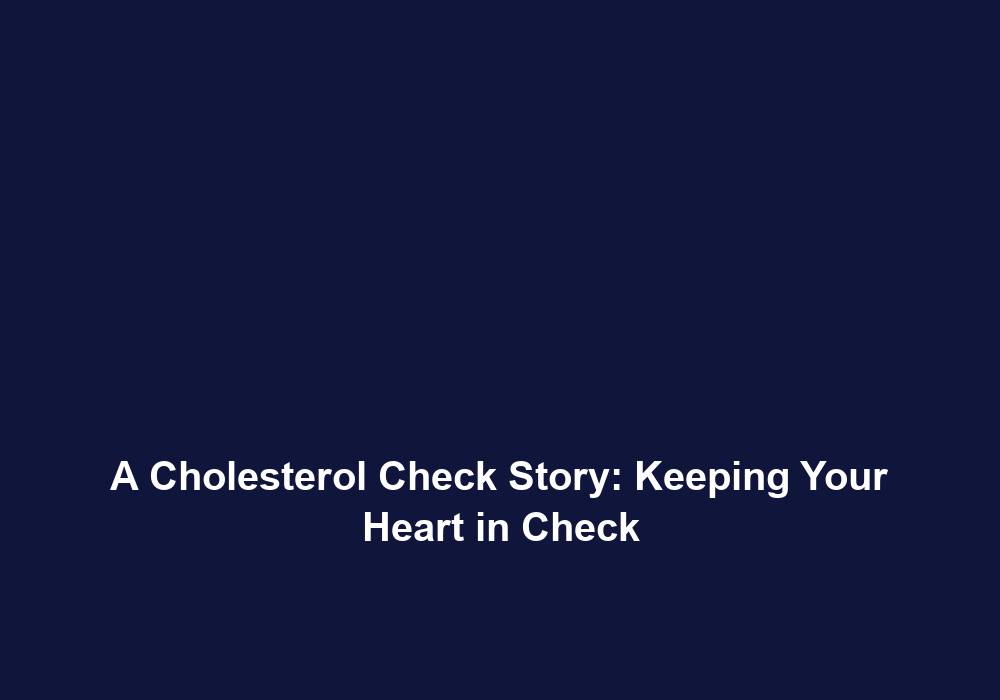A Cholesterol Check Story: Keeping Your Heart in Check
Cholesterol is a vital substance found in the body that plays a crucial role in various functions. It is necessary for the formation of cell membranes, the production of certain hormones, and the synthesis of vitamin D. However, when cholesterol levels become imbalanced, it can have a significant impact on heart health. Regularly monitoring cholesterol levels is essential for maintaining a healthy heart and preventing potential cardiovascular diseases. In this article, we will explore the importance of cholesterol checks and provide valuable insights on how to keep your heart in check.
Understanding Cholesterol and its Impact on Heart Health
Cholesterol is a waxy, fat-like substance that is produced by the liver and obtained from the foods we consume. There are two types of cholesterol: low-density lipoprotein (LDL) and high-density lipoprotein (HDL), often referred to as bad and good cholesterol, respectively.
1. LDL Cholesterol:
LDL cholesterol is considered the bad cholesterol as it tends to build up in the walls of the arteries, forming plaque. This buildup can narrow the arteries, restrict blood flow, and increase the risk of heart diseases, such as heart attacks and strokes. To maintain healthy cholesterol levels, it is important to minimize LDL cholesterol in the body.
2. HDL Cholesterol:
HDL cholesterol, on the other hand, is known as the good cholesterol. It helps remove LDL cholesterol from the arteries and transports it back to the liver, where it can be eliminated from the body. Higher levels of HDL cholesterol are associated with a lower risk of heart diseases. Increasing HDL cholesterol levels can be beneficial for overall heart health.
The Importance of Regular Cholesterol Checks
Regular cholesterol checks are crucial for assessing heart health and identifying any potential risks or imbalances. These checks involve a simple blood test that measures cholesterol levels and provides valuable insights into cardiovascular condition. By monitoring cholesterol levels, you can:
-
Detect Early Warning Signs: Cholesterol checks can help identify abnormal cholesterol levels at an early stage, allowing necessary preventive measures to be taken before they escalate into serious heart problems. Early detection is key to preventing heart diseases.
-
Assess Heart Disease Risk: Monitoring cholesterol levels enables healthcare providers to evaluate the risk of developing heart diseases. Elevated LDL cholesterol levels are a significant risk factor for cardiovascular issues, and early detection can help individuals make lifestyle changes or pursue medical interventions to manage the risk.
-
Track the Effectiveness of Treatment: If you have already been diagnosed with high cholesterol or cardiovascular disease, regular cholesterol checks can help assess the effectiveness of the treatment plan. These checks allow adjustments to be made to medication dosage or lifestyle modifications to ensure optimal heart health. Monitoring progress is essential for successful management of cholesterol levels.
How to Keep Your Heart in Check
Maintaining a healthy heart involves a holistic approach, combining healthy lifestyle choices with appropriate medical interventions. Here are some essential strategies for keeping your heart in check:
1. Adopt a Heart-Healthy Diet
What you eat greatly influences cholesterol levels and overall heart health. Incorporate the following dietary recommendations to support healthy cholesterol levels:
-
Choose Healthy Fats: Replace saturated and trans fats found in red meat, full-fat dairy products, and processed foods with heart-healthy fats like those found in avocados, nuts, seeds, and olive oil. These fats can help lower LDL cholesterol levels and promote heart health.
-
Increase Fiber Intake: Include ample amounts of soluble fiber in your diet, as it helps lower LDL cholesterol levels. Whole grains, fruits, vegetables, and legumes are excellent sources of dietary fiber. Fiber can also aid in maintaining a healthy weight.
-
Consume Omega-3 Fatty Acids: Omega-3 fatty acids, found in fatty fish like salmon and sardines, have been shown to reduce inflammation and lower triglyceride levels. Including these healthy fats in your diet can contribute to a healthier heart.
2. Engage in Regular Physical Activity
Physical activity is beneficial for heart health in multiple ways. Regular exercise can help lower LDL cholesterol levels, increase HDL cholesterol levels, improve circulation, and maintain a healthy weight. Aim for at least 150 minutes of moderate-intensity aerobic exercise, such as brisk walking, cycling, or swimming, each week. Exercise can also reduce stress levels, which is important for heart health.
3. Maintain a Healthy Weight
Excess body weight, especially around the waistline, can contribute to high cholesterol levels and increase the risk of heart diseases. By maintaining a healthy weight through a balanced diet and regular exercise, you can effectively manage cholesterol levels and promote heart health. It is important to focus on overall wellness and maintain a healthy lifestyle.
4. Limit Alcohol Consumption and Quit Smoking
Excessive alcohol consumption can lead to increased cholesterol levels and contribute to heart diseases. It is essential to consume alcohol in moderation or, preferably, avoid it altogether. Additionally, smoking damages blood vessels, lowers HDL cholesterol levels, and increases the risk of heart diseases. Quitting smoking is one of the most impactful steps you can take to keep your heart in check. Seek support and resources to quit smoking if needed.
5. Follow Prescribed Medications and Treatment Plans
If you have been diagnosed with high cholesterol or cardiovascular disease, it is crucial to follow prescribed medications and treatment plans diligently. Medications, such as statins, can help lower LDL cholesterol levels, reduce inflammation, and minimize the risk of heart diseases. Always consult with your healthcare provider and adhere to their recommendations. Compliance with medication and treatment plans is essential for managing cholesterol levels effectively.
Conclusion
Regular cholesterol checks and proactive heart health management are essential for keeping your heart in check. By understanding the impact of cholesterol on heart health, adopting a heart-healthy diet, engaging in regular physical activity, maintaining a healthy weight, and avoiding excessive alcohol consumption and smoking, you can significantly reduce the risk of heart diseases. Prevention is key, and taking care of your heart now will benefit you in the long run. Stay proactive, stay healthy!







